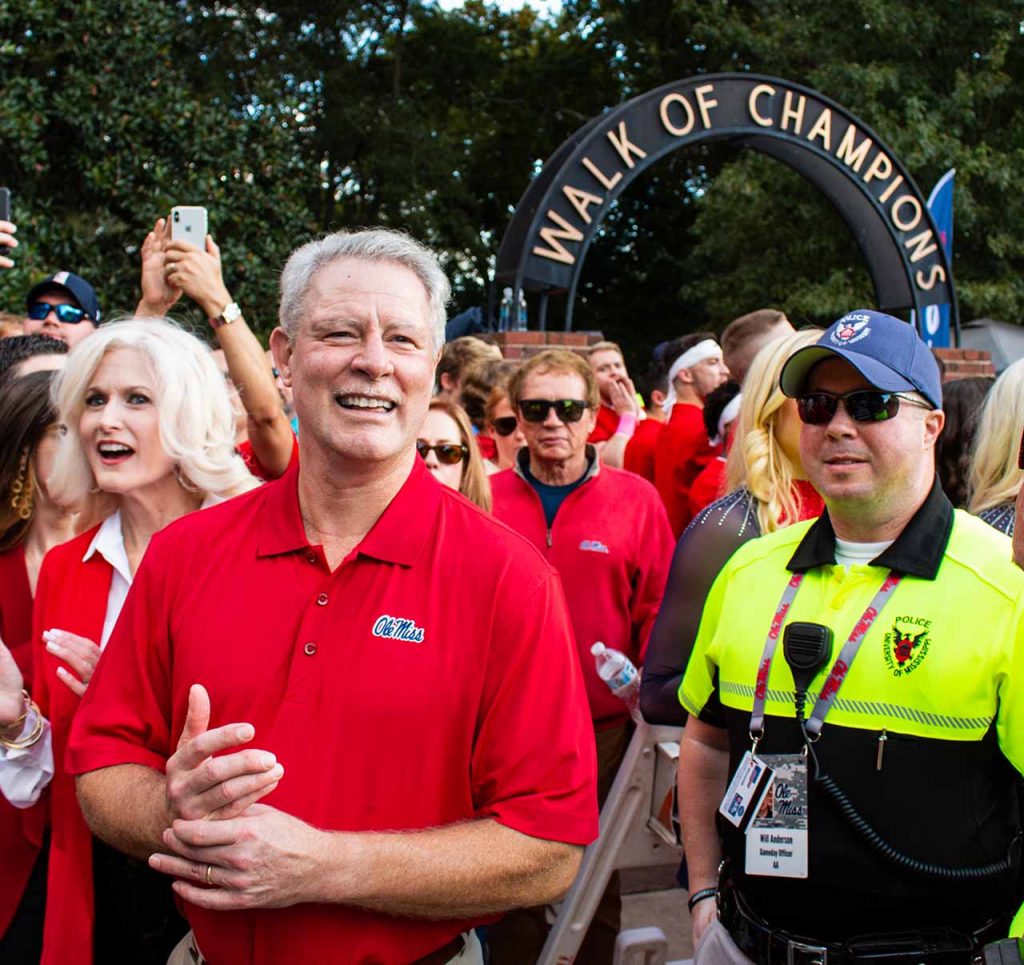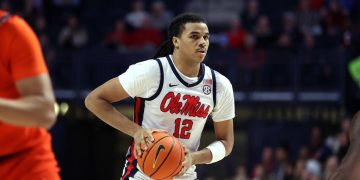
Several candidates who applied for the University of Mississippi chancellor job believe they were misled by Glenn Boyce, who ultimately received the appointment, about his own interest in the job in one-on-one meetings with him earlier this year.
Five of the seven applicants who spoke to Mississippi Today said they applied at Boyce’s urging at a time when he was a consultant paid to, according to the contract obtained by Mississippi Today, “solicit input from University of Mississippi constituencies on qualifications and characteristics desired for the next chancellor.”
Given that task, each of the people who spoke to Mississippi Today now question whether Boyce had his own agenda the whole time.
Each of them asked not to be named out of fear it would harm their professional and business relationships with the university or their chances of being considered for other university leadership posts in the future.
“He told me I was qualified and that it would be worth my time to apply,” one applicant said of Boyce. “I opened up with him and I shared my vision for the university, which he could’ve used for himself at any point later in the process. I would never have shared that with him if I had known he would later become a candidate. Never.”
Boyce, in a statement to Mississippi Today, said he cares deeply for the university and wants to help the IHL board understand the school’s current needs.
“Everything I learned during this process I communicated freely with the people who contacted me and expressed interest in the position,” Boyce said.
The Institutions of Higher Learning board of trustees appointed Boyce on Oct. 3. He never applied for the job, and the IHL board granted him a late interview and skipped steps in the search process that would have allowed university stakeholders to vet him and share feedback before a final decision.
Previously, Boyce was an IHL search consultant from late January through at least June 2019, according to a copy of his contract.
He was paid a total of $87,234.85 by the University of Mississippi Foundation, which typically helps pay for high-profile searches in the university administration. That total includes a $165 per hour fee and travel expenses.
Boyce met with powerful alumni and donors, sometimes traveling cross-country, asking what they wanted to see in the next chancellor.
In addition to compiling a desired candidate profile, the consulting contract calls for consulting and advising on “the transitional period ahead of the selection of a new chancellor,” “UM contextualization and diversity issues/matter/processes,” “UMMC related issues,” and “UM public relations issues.”
Boyce used the findings of his consulting work to compile a 10-point profile that later served as the IHL board’s reference point when they began the chancellor interview process, IHL officials and Boyce said in a phone call with reporters on Oct. 4.
“As the process continued, it became clear (Boyce) met that profile better than anyone else in our search,” IHL board member Ford Dye, chairman of the chancellor search, told reporters on Oct. 4. “The board unanimously felt he was the best fit to lead Ole Miss.”
In addition to meeting with influential alumni and donors, Boyce sought individuals who had privately expressed interest in the chancellor position after former Chancellor Jeff Vitter announced his resignation in November 2018.
“When I met with Glenn in the spring, it was understood that he was a consultant and wouldn’t be a candidate,” one chancellor applicant told Mississippi Today. “Later, I heard the rumor that he was in the running. I reached out, and he denied it. He said, ‘I’m not interested in the job. Don’t want it, wouldn’t take it.’ I’ve been thinking a lot about that conversation the past few days.”
Other candidates said they applied at Boyce’s urging.
“I was honest with him about my doubts about whether I should apply, and he encouraged me to do it. He was very supportive,” a third applicant said. “He said he was taking this consulting work on and was out trying to help (the IHL board) identify characteristics for the next chancellor. He told me, ‘I think you have those characteristics.’”
Three candidates told Mississippi Today that Boyce warned them against actively lobbying for the job, including through surrogates. When Boyce was announced as the new chancellor, Dye, the IHL board’s search chairman, explained to reporters that the IHL board thought highly of Boyce because he “received more nominations than any other candidate.”
Some candidates told Mississippi Today that they questioned Boyce’s intentions from their meetings with him as early as February.
“He had to have known he was interested in the job at that time,” a fourth candidate said.
That candidate added that even if Boyce was not interested in the job when they talked, Boyce should have “picked up the phone and (called) the other candidates who he’d talked to earlier in the year to give us a heads up.”
Rumors of Boyce’s interest in the chancellor position swirled in Oxford as early as May. The names of rumored candidates began appearing on widely read sports message boards, which serve as virtual trading posts for Ole Miss gossip and attract an audience of influencers.
Even though most of the users are anonymous, many appear to have insider knowledge on topics ranging from Mississippi politics to IHL board deliberations. Boyce’s name appearing on these boards prompted some alumni to warn IHL against hiring Boyce at an early September listening session.
A week before the IHL board began interviewing finalists, a source shared with Mississippi Today the names of the eight candidates the board invited to Jackson for official interviews. Boyce was not on that list.
But by the end of the second interview day on Oct. 3, the IHL board voted to invite Boyce to interview. Sources inside the interview room, at University of Mississippi Medical Center in Jackson, told Mississippi Today that Boyce arrived approximately 10 minutes later.
Boyce added: “It is disheartening that my role in this process has been so misunderstood. Now, I am focused on getting up to speed on the affairs of the university and moving forward.”
—
The University of Mississippi Foundation footed the bill for Boyce’s consulting contract. UM Foundation President Wendell Weakley laid out the timeline of Boyce’s consulting contract in an Oct. 6 email to the foundation’s 37 board members.
Jan. 15, 2019: IHL Commissioner Al Rankins called Weakley and says the IHL wanted the UM Foundation to pay Boyce, the former IHL commissioner, as a consultant.
“The IHL had drafted a consulting contract for use with Dr. Boyce, but believed it would be better served if private support funds from the foundation could be used versus a state contract,” Weakley wrote to the foundation board members on Oct. 6. “Dr. Rankins had previously discussed this request with Interim Chancellor Larry Sparks who directed him to me.”
Jan. 16, 2019: After Sparks and Weakley identified funding for the consulting contract, Weakley called Boyce to discuss the terms of the contract before it was finalized.
“At no time during any of these discussions or during the time he performed the work was there any indication Dr. Boyce was or would become a candidate for the chancellor’s position,” Weakley wrote in the Oct. 6 email. “In fact, it was just the opposite. In my subsequent conversations with him and as I believe he stated in our April 26 board meeting, he was not a candidate. Clearly that changed at some point, but that was not our understanding.”
Jan. 18, 2019: The UM Foundation struck a contract with Boyce for the consulting work. He was paid $87,234.85.
“We paid him over the period from February to June 2019 for the work he performed under the contract,” Weakley wrote. “This amount included his travel expenses… We simply helped facilitate the work requested by the IHL.”
Jan. 18, 2019, through June 30, 2019: Boyce meets with university stakeholders to determine what qualities the next chancellor of the University of Mississippi should have.
“Some alumni have strongly criticized our foundation for hiring Dr. Boyce as a consultant so we could back door him into the chancellor’s job,” Weakley wrote. “That is absolutely false. We helped the IHL with its request to develop input from our alumni and friends and then were excluded from the subsequent search process. Those are the only facts I am sure about in all of this.”
Oct. 3, 2019: Boyce interviews for the chancellor position with the IHL board and is quickly offered the position.
“If he was a possible candidate, the IHL should not have recommended him for the consulting work, nor should we have agreed to engage him on their behalf,” Weakley wrote on Oct. 6.


























